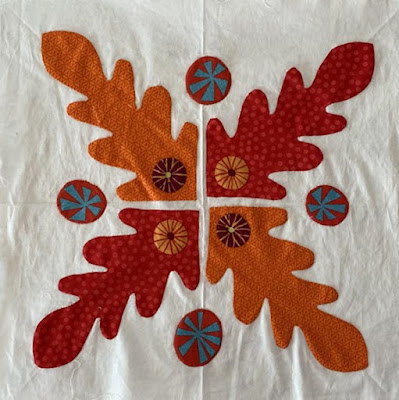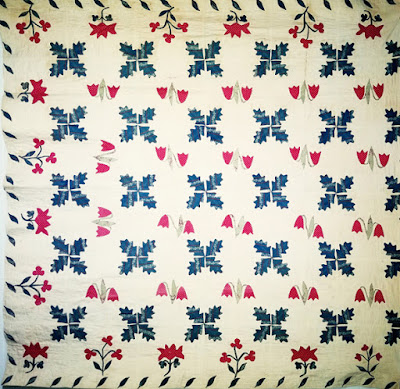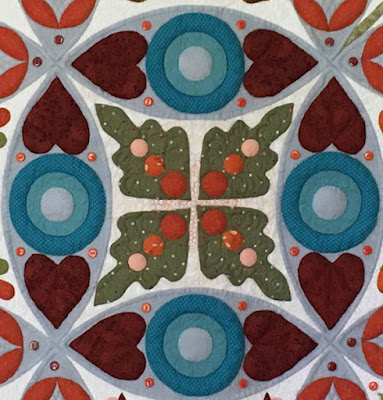Block #2 Quaker Finery
Sarah Smith Collection, Smith College
Lucretia in the shawl and husband James Mott posed with fellow members
of the Executive Committee of the Pennsylvania Anti Slavery Society
in 1851.
These activists administered the well-run underground railroad system in Philadelphia, employing William Still first as a janitor and, soon realizing his skills, as their Secretary and chief clerk.
Lucretia's family moved to Philadelphia in 1809 where she became an important advocate of the antislavery cause (and indeed many reforms.) Frustrated by the anti-female prejudice of the state's first abolition society she and numerous other women founded the Philadelphia Female Anti-Slavery Society in 1833---open to all races and both sexes. They worked beyond the Civil War until 1870.
Nantucket Historical Society
Lucretia dated this silk and wool quilt 1833, the same year she
founded the P.F.A.S.S.
William Still recalled her knitting and sewing during Anti-slavery
meetings. She liked to keep busy.
The Mott's Arch Street neighborhood just before Urban Renewal
destroyed the buildings.
"Lucretia Mott, the mistress of the house ...is sensible and lively, and an abolitionist of the most intrepid school."
The Motts not only talked abolition they broke the law by hosting runaway slaves, most notably Henry Brown, who became quite famous for having been shipped in a crate to the Philadelphia Anti Slavery Society.
William Still and P.A.S.S. friends unboxing Henry "Box" Brown
after 36 hours in a crate.
His worst side effect was a headache.
Quaker Finery by Georgann Eglinski
"I must tell you what an exciting fugitive case we had last week. A citizen of Richmond, Va., called at the office and told Miller McKim and Cyrus Burleigh, that a slave in that city was meditating his escape by being placed in a box, as goods, lo be sent by Adams Express. He was told of the great danger of suffocation, as well as the risk of detection, but was not deterred. After some delays, a telegraph at length apprised Miller of his approach. The box was received at the depot, more carefully handled than it had been before, and safely deposited at the A. S. office, when a trembling tap, and 'All right?' from Miller, was responded to by 'All right, sir!' from the pent-up man. The lid was removed as quickly as the hoops could be loosened, when he rose, with a 'Good morning, gentlemen!'
"Miller says we can hardly conceive the relief and excitement to find the man alive, and the poor fellow's happiness and gratitude; he sung a hymn of praise. He is a large man, weighing nearly two hundred pounds, and was incased in a box two feet long, twenty three inches wide, and three feet high, in a sitting posture. He was provided with a few crackers, and a bladder filled with water, which would make no noise in being turned over, nor yet be liable to be broken; he however ate none, as it would have made him thirsty, and he needed all the water to bathe his head, after the rough turns over, in which he sometimes rested for miles on his head and shoulders, when it would seem as if the veins would burst. He fanned himself almost constantly with his hat, and bored holes for fresh breathing air, with a gimlet or small auger furnished him. The cracks of the box had canvas over, to prevent any inspection, and to appear like goods.
"Dr. Noble says, if he had been consulted, he should have said it would be impossible for the man to be shut up and live twenty-four hours...[Brown] was conducted here, where he gave us his history.... He had a wife and three children sold from him a year ago,...This almost broke his heart; and from that time he resolved on obtaining his own freedom; and having no family to provide for, he laid by enough to hire a white man to undertake his removal in the box....After resting...he was sent on east. "

Lucretia Coffin Mott (1793-1880)
Library Company of Philadelphia
Barbara Brackman's Quaker Finery
The Block
Quaker Finery
International Quilt Museum Collection
The pattern is simple, a feathery leaf repeated four times.
Print this out on an 8-1/2" x 11" sheet of paper. Note
the square inch for scale.
From a repeat block quilt about 1850...
...sashed with a floral
New Jersey album
Four-way feathers were varied.
Denniele Bohannon's Quaker Finery
Dots seem irresistible.
Jeanne Arnieri is adding embroidery
See more about the indefatigable Lucretia Mott in this post:
And better photos of her quilt here:
https://civilwarquilts.blogspot.com/2018/01/lucretia-motts-quilt-in-nantucket.html
Robyn Gragg modified Block #1 to frame the center
of her quilt with Block #2 plus a few dots in the featured spot.
And a small contemporary medallion by Wendy C. Reed
























I really like that you share the information you find in your research about long ago. The older I get the more I find history facinating.
ReplyDeleteTrying to catch up on my blog reading. Don't know how I missed this one. Thanks for the shoutout at the end. I do love this block. Have a great day!
ReplyDelete